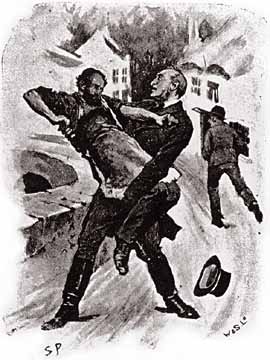| The Speckled Band 2 | The Speckled Band 3 |
“Alas!” replied our visitor, “the very horror of my situation lies in the fact that my fears are so vague, and my suspicions depend so entirely upon small points, which might seem trivial to another, that even he to whom of all others I have a right to look for help and advice looks upon all that I tell him about it as the fancies of a nervous woman. He does not say so, but I can read it from his soothing answers and averted eyes. But I have heard, Mr. Holmes, that you can see deeply into the manifold wickedness of the human heart. You may advise me how to walk amid the dangers which encompass me.”
“I am all attention, madam.”
“My name is Helen Stoner, and I am living with my stepfather, who is the last survivor of one of the oldest Saxon families in England, the Roylotts of Stoke Moran, on the western border of Surrey.”
Holmes nodded his head. “The name is familiar to me,” said he.
“The family was at one time among the richest in England, and the estates extended over the borders into Berkshire in the north, and Hampshire in the west. In the last century, however, four successive heirs were of a dissolute and wasteful disposition, and the family ruin was eventually completed by a gambler in the days of the Regency. Nothing was left save a few acres of ground, and the two-hundred-year-old house, which is itself crushed under a heavy mortgage. The last squire dragged out his existence there, living the horrible life of an aristocratic pauper; but his only son, my stepfather, seeing that he must adapt himself to the new conditions, obtained an advance from a relative, which enabled him to take a medical degree and went out to Calcutta, where, by his professional skill and his force of character, he established a large practice. In a fit of anger, however, caused by some robberies which had been perpetrated in the house, he beat his native butler to death and narrowly escaped a capital sentence. As it was, he suffered a long term of imprisonment and afterwards returned to England a morose and disappointed man.
“When Dr. Roylott was in India he married my mother, Mrs. Stoner, the young widow of Major-General Stoner, of the Bengal Artillery. My sister Julia and I were twins, and we were only two years old at the time of my mother’s re-marriage. She had a considerable sum of money – not less than £1000 a year – and this she bequeathed to Dr. Roylott entirely while we resided with him, with a provision that a certain annual sum should be allowed to each of us in the event of our marriage. Shortly after our return to England my mother died – she was killed eight years ago in a railway accident near Crewe. Dr. Roylott then abandoned his attempts to establish himself in practice in London and took us to live with him in the old ancestral house at Stoke Moran. The money which my mother had left was enough for all our wants, and there seemed to be no obstacle to our happiness.
“But a terrible change came over our stepfather about this time. Instead of making friends and exchanging visits with our neighbours, who had at first been overjoyed to see a Roylott of Stoke Moran back in the old family seat, he shut himself up in his house and seldom came out save to indulge in ferocious quarrels with whoever might cross his path. Violence of temper approaching to mania has been hereditary in the men of the family, and in my stepfather’s case it had, I believe, been intensified by his long residence in the tropics. A series of disgraceful brawls took place, two of which ended in the police-court, until at last he became the terror of the village, and the folks would fly at his approach, for he is a man of immense strength, and absolutely uncontrollable in his anger.

“Last week he hurled the local blacksmith over a parapet into a stream, and it was only by paying over all the money which I could gather together that I was able to avert another public exposure. He had no friends at all save the wandering gypsies, and he would give these vagabonds leave to encamp upon the few acres of bramble-covered land which represent the family estate, and would accept in return the hospitality of their tents, wandering away with them sometimes for weeks on end. He has a passion also for Indian animals, which are sent over to him by a correspondent, and he has at this moment a cheetah and a baboon, which wander freely over his grounds and are feared by the villagers almost as much as their master.
“You can imagine from what I say that my poor sister Julia and I had no great pleasure in our lives. No servant would stay with us, and for a long time we did all the work of the house. She was but thirty at the time of her death, and yet her hair had already begun to whiten, even as mine has.”
“Your sister is dead, then?”
| The Speckled Band 2 | The Speckled Band 3 |